Restoring Cambodia’s Ecosystems: The Return of the Elongated Tortoise
By Christel Griffioen
Turtle Survival Alliance has been visiting and providing helpful husbandry recommendations to the Angkor Centre for Conservation of Biodiversity (ACCB) for many years. As a conservation center of the Allwetterzoo Münster in Germany, and established in collaboration with the Zoological Society for the Conservation of Species and Population, the Angkor Centre for Conservation of Biodiversity manages many local species, including several turtles and tortoises. We first met Christel Griffioen on a visit to ACCB in 2015, and immediately recognized her drive and interest in wanting to do more. It came as no surprise to us when she called in 2018, during the massive confiscation of 10,000 Radiated Tortoises, and said she wanted to go to Madagascar to help. Six months later, Christel officially joined the Madagascar team. Following a two-year deployment into the most remote areas of Madagascar, Christel returned to Cambodia and ACCB as the Director at the onset of the Covid-19 pandemic. Since then Turtle Survival Alliance has continued to work with Christel and ACCB on multiple projects.
The Elongated Tortoise (Indotestudo elongata), a native of South and Southeast Asia, is currently undergoing a severe population decline, with estimates suggesting an 80% reduction. Deforestation for agriculture and urban development has drastically reduced their natural habitats while hunting for meat and traditional medicine has significantly diminished their numbers. Protecting the remaining wild populations and reintroducing captive-bred tortoises is now crucial for their survival.
ACCB manages and breeds several species of turtles and tortoises from Cambodia, and has taken significant steps in the conservation and reintroduction of the critically endangered Elongated Tortoise. ACCB established and maintains the world’s largest conservation assurance population of Elongated Tortoises, consisting of individuals from the wild that were rescued and rehabilitated. Following a successful breeding program, ACCB launched the first soft-release program for captive-bred Elongated Tortoises in Cambodia. The objective is to evaluate the feasibility of introducing captive-bred tortoises into wild populations and ultimately reintroducing ecologically meaningful numbers of tortoises into their natural habitat in Cambodia, thereby aiding in ecosystem restoration.
Prior to their release, the tortoises at ACCB underwent extensive health screenings, which included physical examinations and tests for chelonian bacterial and viral pathogens. This ensures that only healthy tortoises are released, minimizing any potential risk to wild individuals at the release site.
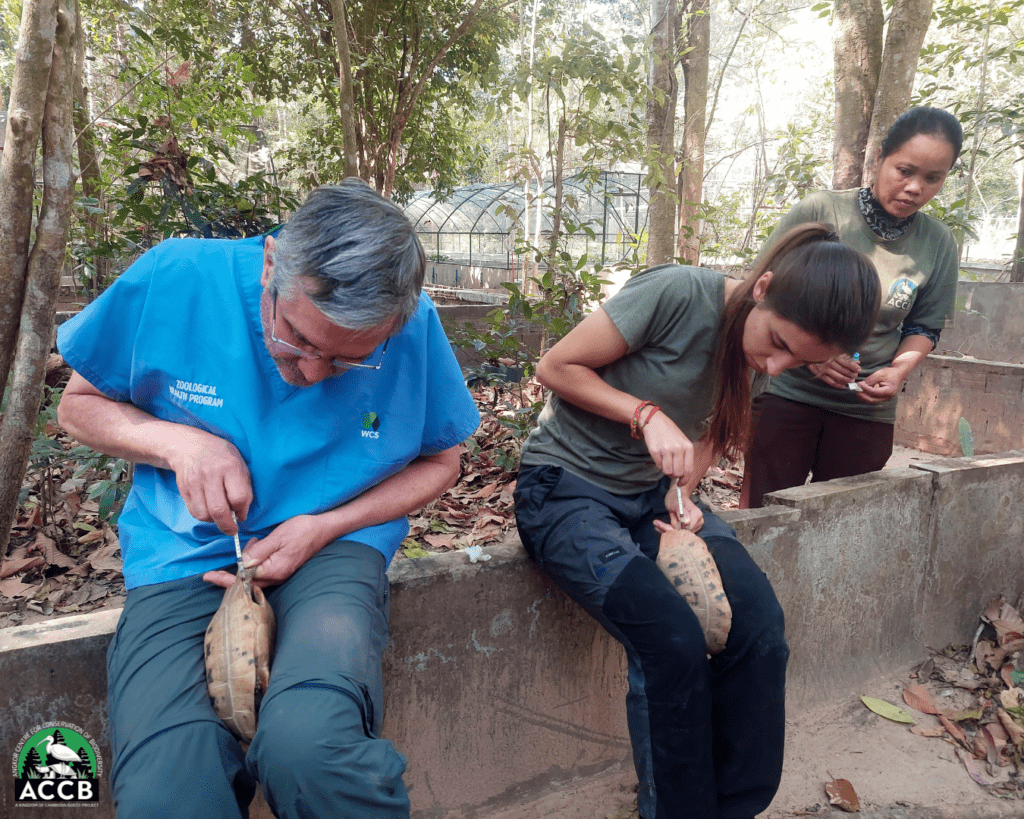
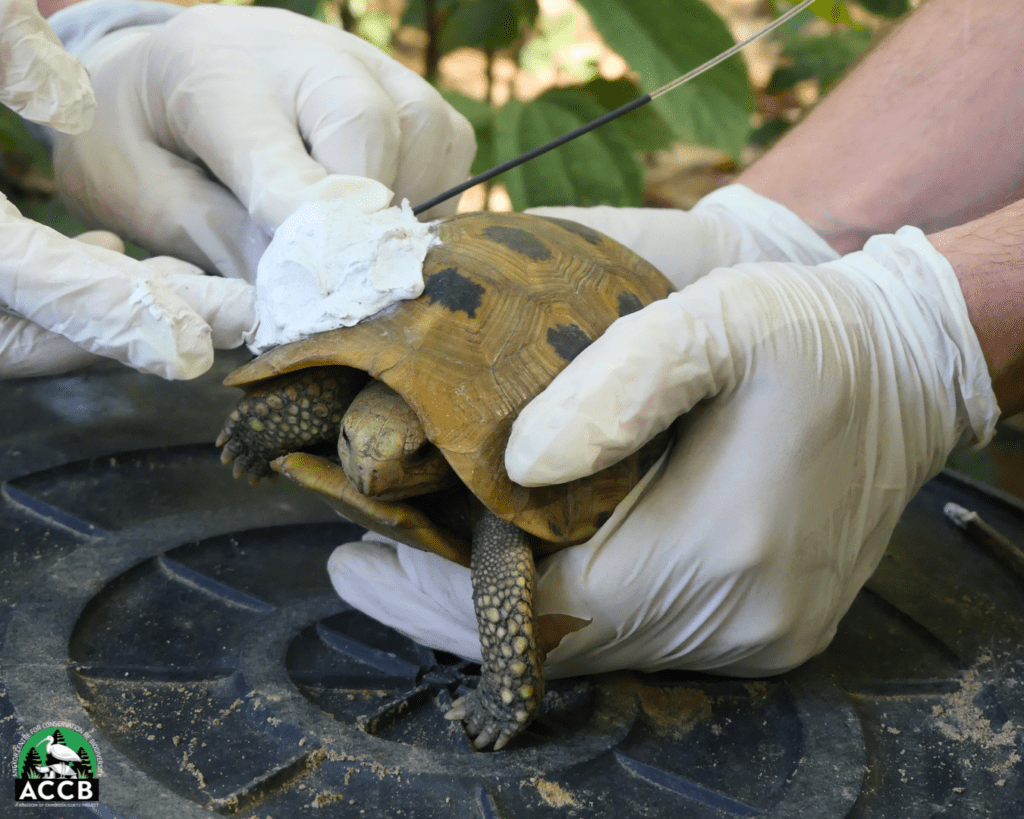
In April 2023, 100 captive-bred tortoises were transferred into a one-hectare acclimation pen within a protected area. Government officials, community members, and Buddhist monks were invited to welcome the tortoises upon their arrival to the acclimation pen. All tortoises and the project team received blessings of good luck from the Buddhist monks. Involving the community and religious leaders in the release program encourages a sense of ownership and highlights the milestone steps toward conservation.
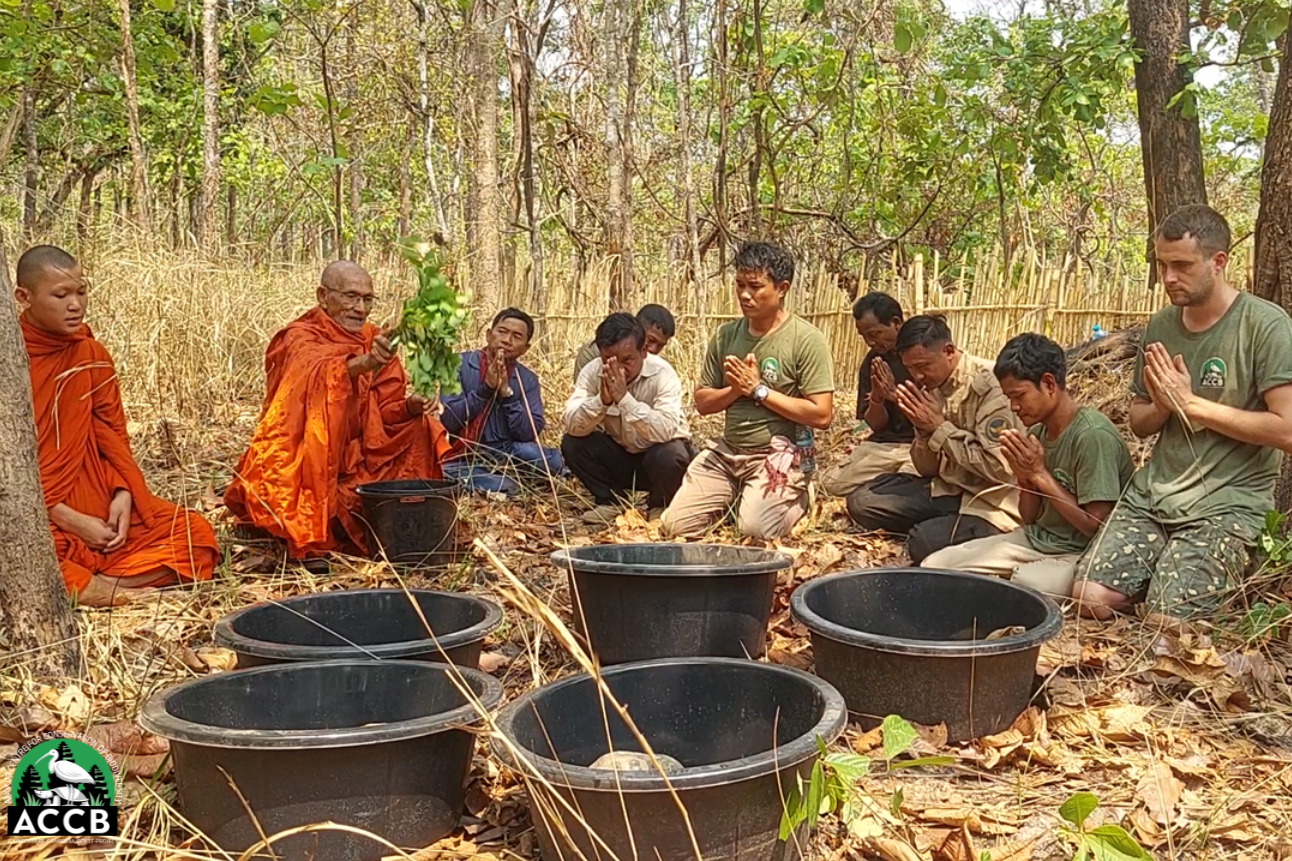
Once in the acclimation pen, local “Tortoise Guardians” monitored and guarded them. The site, characterized by semi-evergreen and deciduous dipterocarp forests, offered an ideal environment for the tortoises to adapt to their new surroundings. Over the next nine months, from April 2023 to January 2024, the tortoises gradually acclimated to the wild. Our team conducted monthly health checks and monitored their progress.
In January 2024, the acclimation pen was opened, allowing the tortoises to self-liberate. This was a significant day for the entire project team and for me. It was particularly rewarding—and dare I say, emotional—to see the tortoises that were bred under my care, in 2015 and 2016, take their first steps in the wild. It was one of the most special moments of my life.
To gain a deeper understanding of the tortoises’ post-release behavior, a subset of the tortoises were fitted with GPS and VHF radio trackers. These devices provide invaluable data on their movement, habitat preferences, and survival rates. The project field team, led by Jack, diligently monitors the tortoises, collecting data weekly. This effort not only ensures the tortoises’ safety but also provides insights into their ecological needs and how they establish home ranges in the wild. Seeing the dedication and interest of the local Tortoise Guardians is both humbling and rewarding. I am proud of their dedication and how well they have picked up the skills of monitoring the tortoises and understanding their behavioral patterns. Our work would be far more challenging without their contributions and skills.
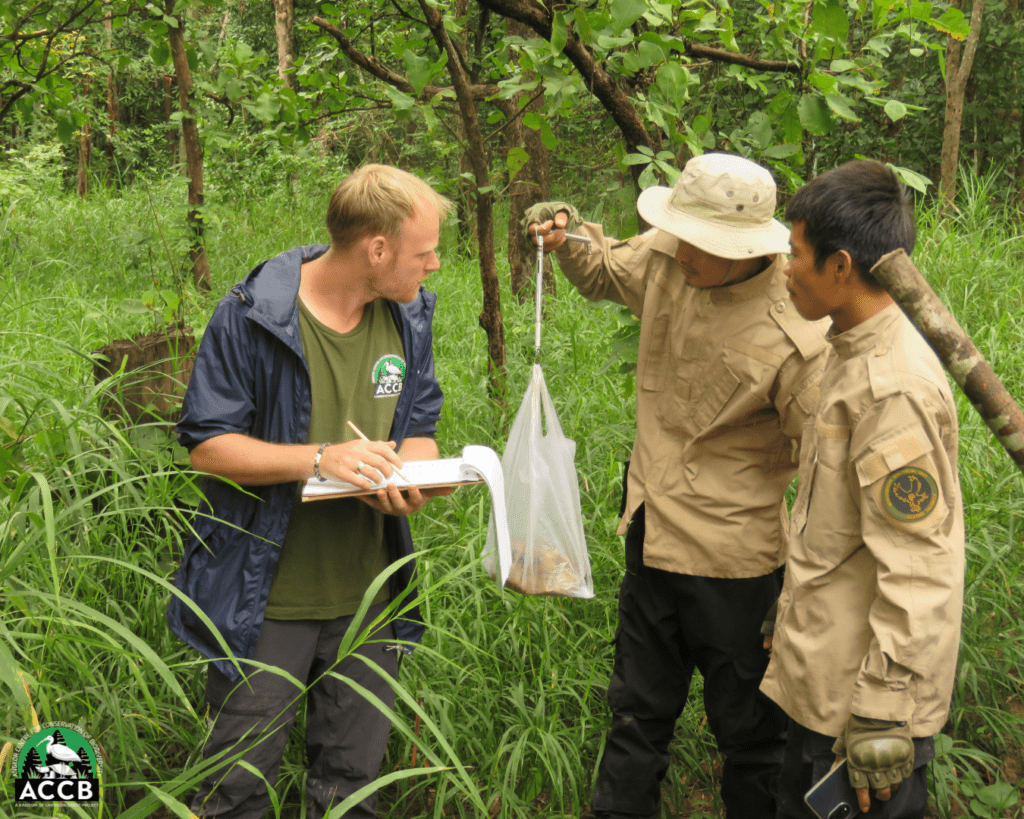
Preliminary data from the first few months post-release indicate that the tortoises have not dispersed far from the release site, which is consistent with their expected behavior during the dry season. As the wet season progresses, increased movement and dispersal are anticipated, providing further insights into their habitat preferences and survival strategies. Cambodia has two main seasons: wet and dry, with distinct cooler and warmer periods within each. While fieldwork during the hot dry season is tough and uncomfortable, it is almost easy compared to the wet season when the habitat floods and becomes nearly impassable. Reaching the release site often involves wading through waist-deep water, trying to keep motorbikes afloat, sleeping in hammocks, and dealing with clothing that won’t dry—not to mention encountering large terrestrial leeches while searching for tortoises in the tall grasses. The possibility of encountering a critically endangered Siamese Crocodile (Crocodylus siamensis) also inhabiting the area is both exciting and a little nerve-wracking. But then, being awoken by the calls of Giant (Thaumatibis gigantea) and White-shouldered (Pseudibis davisoni) ibises, some of the world’s rarest bird species, and seeing the tortoises back in the wild where they belong, makes it all worth it.
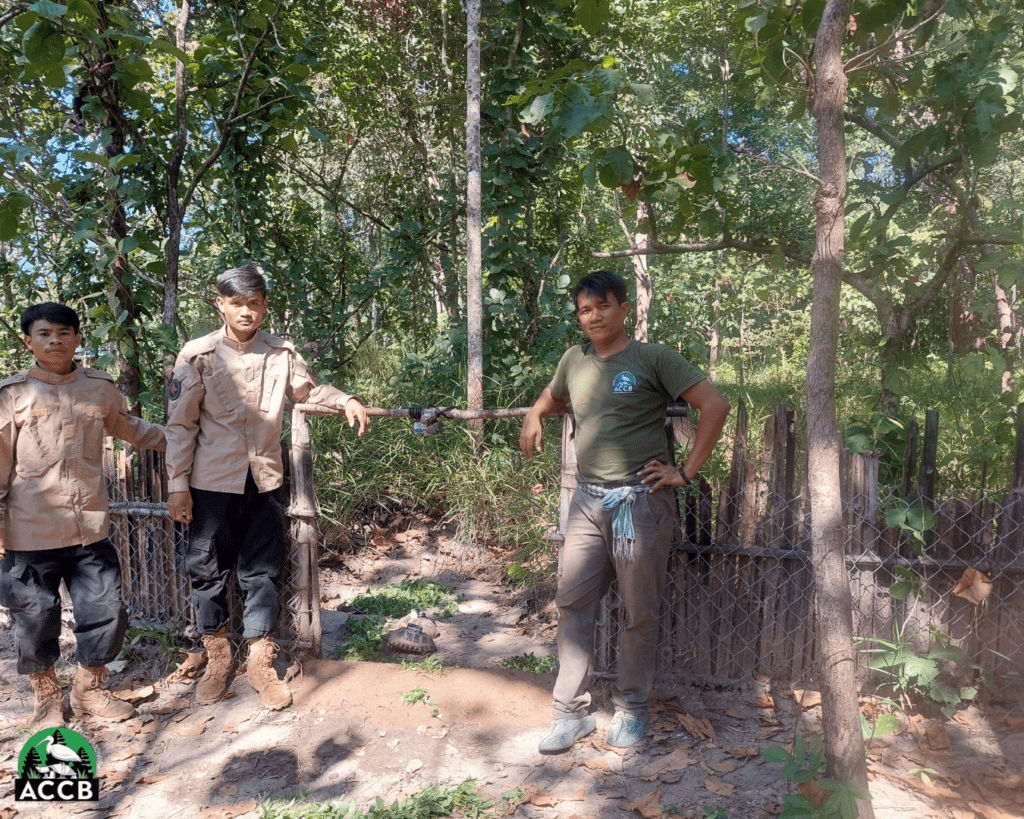
The success of this pilot reintroduction study is a testament to the collaborative efforts of ACCB, relevant government agencies, our project partners at Rising Phoenix and WCS, local community members, donors, and sponsors. The ongoing data collection will provide crucial insights that will guide future reintroduction efforts and improve the survival chances of this critically endangered species. The journey of the Elongated Tortoise’s reintroduction in Cambodia is still unfolding, but the commitment and dedication of everyone involved offers hope for the future of this remarkable species. As we continue to monitor and adapt our strategies, we aim to ensure that these tortoises not only survive but thrive in their natural habitat.
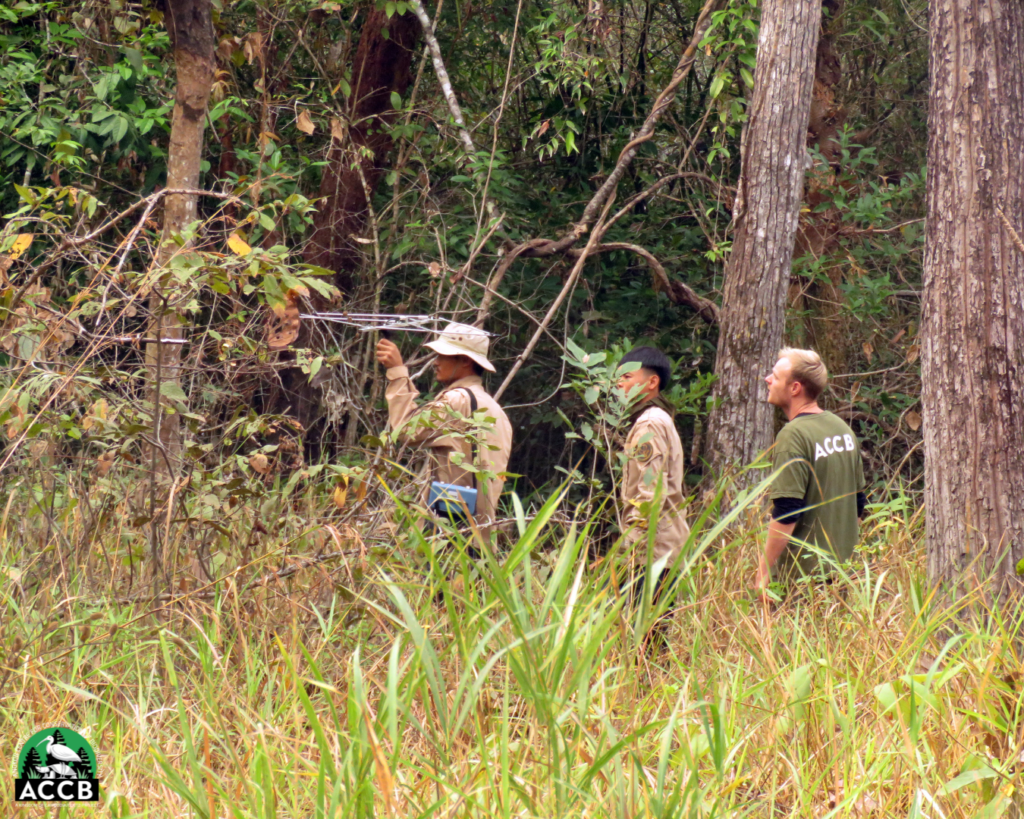
For more updates on our conservation efforts and the ongoing success of the Elongated Tortoise reintroduction program, follow ACCB on social media platforms: Facebook, Instagram, LinkedIn
Acknowledgements: We would like to express our gratitude to the ACCB staff, both past and present, with special appreciation to Jason Miller, Maria Blümm Rexach, Kees Groot, Phorn Sreymom, Jack Willis, and Chao Lengthol. We also thank Allwetterzoo Münster, the Ministry of Environment, the Forestry Administration of the Ministry of Agriculture Forestry and Fisheries, Rising Phoenix Co. Ltd, and the Wildlife Conservation Society for their invaluable support. Our project partners would like to acknowledge the Association of Reptile and Amphibian Veterinarians, Berufsverband der Zootierpfleger e.V., the Critical Ecosystem Partnership Fund, IUCN, Holohil, the IUCN SSC Asian Species Action Partnership, Re:Wild, Stiftung Artenschutz, Turtle Conservation Fund, and Tropical World Leeds for their contributions and collaboration. The Critical Ecosystem Partnership Fund is a joint initiative of Margaret A. Cargill Philanthropies, l’Agence Française de Développement, Conservation International, the European Union, the Global Environment Facility, the Government of Japan, and the World Bank. A fundamental goal is to ensure civil society is engaged in biodiversity conservation.
Header image: Veterinarian Maria Blümm with an Elongated Tortoise (Indotestudo elongata) fitted with VHF radio and GPS transmitters. All Photos courtesy of ACCB.
